CHAPTER X.
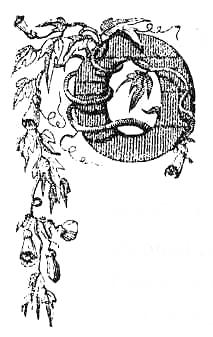
PPOSITE
Rhinebeck Station is the old Kingston Landing, where the three thousand British
troops under General Vaughan disembarked, and marched to the village of Kingston,
two miles in the interior, and laid it in ashes. That point was the port of
Kingston until within a few years, and the New York and Albany steamboats
stopped there, but the thriving village at the mouth of the Rondout Creek,
about a mile below, has caused it to be abandoned.
The village of Kingston (originally called Esopus)--situated upon a broad plain on the banks of the Esopus Creek, with a fine range of the southern Katzbergs in the rear--is one of the oldest settlements in the State of New York.* As early as 1614, Dutch traders built a redoubt at the mouth of Rondout (a corruption of Redoubt) Creek. A few families settled soon afterwards upon or near the site of Kingston, and called the place Wiltwyck, or Wild Indian Town. They were soon dispersed by the savages. Another settlement then followed; again the savages dispersed them. Finally, in 1660, a treaty was concluded that seemed to promise security to the settlers. But the wrath of the Indians became fiercely kindled against the white people by Governor Stuyvesant, who sent eleven Indian captives to Curaçon, and sold them for slaves. In June, 1663, the Indians came into the open fort in great numbers, professedly to trade. At a concerted signal they fell upon the white people, murdered eighteen of them, and carried away forty-two as captives. The out settlements were all destroyed. A destructive war ensued. The Indians were expelled from the fort, and nine days afterwards a reinforcement came from New Amsterdam. The savages were pursued and almost exterminated. In the autumn they returned all the captives but three, and sued for peace.
Many of the persecuted Huguenot families who fled from France
settled at Kingston and in its vicinity, 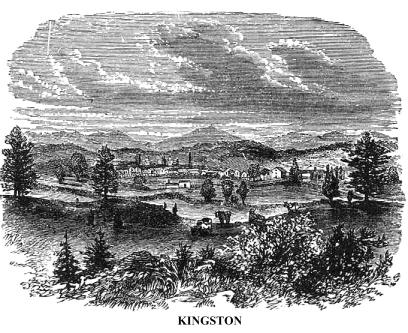 towards
the close of the seventeenth century; and when the war for independence broke
out in 1775, their descendants were found on the side of the republicans.
Kingston was called a "nest of rebels." There, in the spring of
1777, the representatives of the people of the State formed a state constitution,
and organized civil government under it. The first session of the legislature
was held there in July following, but the members were obliged to flee in
the autumn, on the approach of Vaughan and his troops. These ascended the
river from the Highlands, where Sir Henry Clinton had gained a victory, taken
possession of Forts Clinton and Montgomery, and destroyed the obstructions
in the river which prevented vessels passing northward. The object of Vaughan's
expedition, as we have said, was to draw the attention of Gates and his army
(then casting their meshes around Burgoyne) to the country below, where devastation
and rain were threatened. After passing the Highlands, they distressed the
people along the shores of the river very much by burnings and plunderings.
They landed at the port of Esopus, or Kingston, on the 13th of October, and
proceeded to the village in two divisions. The town contained about 300 inhabitants,
and the houses were mostly of stone. The people fled with what property they
could carry away, and the soldiery burned every house but one.
towards
the close of the seventeenth century; and when the war for independence broke
out in 1775, their descendants were found on the side of the republicans.
Kingston was called a "nest of rebels." There, in the spring of
1777, the representatives of the people of the State formed a state constitution,
and organized civil government under it. The first session of the legislature
was held there in July following, but the members were obliged to flee in
the autumn, on the approach of Vaughan and his troops. These ascended the
river from the Highlands, where Sir Henry Clinton had gained a victory, taken
possession of Forts Clinton and Montgomery, and destroyed the obstructions
in the river which prevented vessels passing northward. The object of Vaughan's
expedition, as we have said, was to draw the attention of Gates and his army
(then casting their meshes around Burgoyne) to the country below, where devastation
and rain were threatened. After passing the Highlands, they distressed the
people along the shores of the river very much by burnings and plunderings.
They landed at the port of Esopus, or Kingston, on the 13th of October, and
proceeded to the village in two divisions. The town contained about 300 inhabitants,
and the houses were mostly of stone. The people fled with what property they
could carry away, and the soldiery burned every house but one.
It is related that when the British landed at Kingston Point, some Dutchmen were at work just below it, and were not aware of the fact until they saw the dreaded "red-coats" near them. It was low water, and across the flats on the river shore they fled toward the place of the present village of Rondout as fast as their legs could carry them, not presuming to look behind them, lest, like Lot's wife, they might be detained. The summer haymakers had left a rake on the marsh meadow, and upon this one of the fugitives trod. The handle flew up behind him, and gave him a severe blow on the back of his head. Not doubting that a "Britisher" was close upon his heels, he stopped short, and throwing up his hands imploringly, exclaimed, "O mein Got! mein Got! I kivs up. Hoorah for King Shorge!" The innocent rake was all the enemy that was near, and the fugitive's sudden conversion was known only to a companion in the race, who had outstripped him a few paces.
Hurley, a few miles from Kingston, became the place of refuge for the sufferers from the conflagration of the latter town. There, while Esopus was in flames, the republicans hanged a spy, who had been caught in the American camp near Newburgh, a few days before. He had been sent by Sir Henry Clinton with a message to Burgoyne. When apprehended on suspicion, he was seen to cast something into his mouth and swallow it. An emetic was administered, and a silver bullet, hollow and elliptical in shape, was produced. In it, written upon tissue paper, was the following note, dated Fort Montgomery, October 8, 1777:--
"Nons y voici, and nothing now between us and Gates. I sincerely hope this little succour of ours may facilitate your operation. In answer to your letter of the 28th, by C.C., I shall only say I cannot presume to order, or even advise, for reasons obvious. I heartily wish you success.
"Faithfully yours, "H. Clinton. "
The prisoner was tried: out of his own mouth he was condemned. He was taken to Hurley, and there hanged upon an apple-tree. That silver bullet and the note are preserved in the family of Governor George Clinton.
Kingston village is a very pleasant one, and the country about it affords delightful drives. Its population in 1860 was about 4,000, and the space between it and Rondout, a mile and a half distant, was rapidly filling up with dwellings. The two villages were already connected by gas-pipes, and public conveyances ply between them continually.
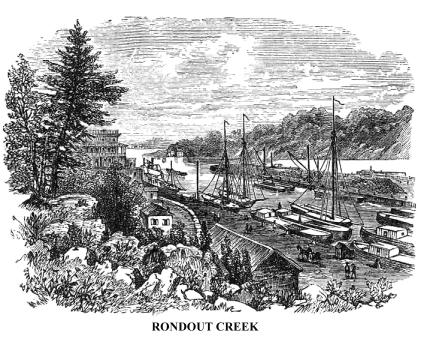 Rondout
(Redoubt), at the mouth of Rondout Creek, is one of the busiest places on
the river between Albany and New York. It was formerly called the Strand,
then Kingston Landing, and finally Bolton, in honour of the then president
of the Delaware and Hudson Canal Company. That canal, which penetrates the
coal region of Pennsylvania, has its eastern terminus at Eddyville, two and
a half miles up the Rondout Creek; and the mouth of that stream is continually
crowded with vessels engaged in carrying coals and other commodities. Immense
piers have been erected in the middle of the stream for the reception and
forwarding of coal. Here, and in the vicinity, are manufactories of cement,
and also extensive quarries of flagstone--all of which, with the agricultural
products of the adjacent country, giving freights to twenty steamboats and
many sailing vessels. Lines of steamers run regularly from Rondout to Albany
and New York, and intermediate places, and a steam ferry-boat connects the
place with the Rhinebeck Station.
Rondout
(Redoubt), at the mouth of Rondout Creek, is one of the busiest places on
the river between Albany and New York. It was formerly called the Strand,
then Kingston Landing, and finally Bolton, in honour of the then president
of the Delaware and Hudson Canal Company. That canal, which penetrates the
coal region of Pennsylvania, has its eastern terminus at Eddyville, two and
a half miles up the Rondout Creek; and the mouth of that stream is continually
crowded with vessels engaged in carrying coals and other commodities. Immense
piers have been erected in the middle of the stream for the reception and
forwarding of coal. Here, and in the vicinity, are manufactories of cement,
and also extensive quarries of flagstone--all of which, with the agricultural
products of the adjacent country, giving freights to twenty steamboats and
many sailing vessels. Lines of steamers run regularly from Rondout to Albany
and New York, and intermediate places, and a steam ferry-boat connects the
place with the Rhinebeck Station.
The population of Rondout was about 6,000 in 1860. The greater proportion of the able-bodied men and boys were, in some way, connected with the coal business. Another village, the offspring of the same trade, and of very recent origin, stands just below the mouth of the Rondout Creek. It was built entirely by the Pennsylvania Coal Company. From that village, laid out in 1851, and containing a population of about 1,400 souls, a large portion of the coal brought to the Hudson on the canal was shipped in barges for the north and west. It is called Port Ewen, in honour of John Ewen, then president of the company.
Placentia is the name of the beautifully situated country seat of the late James Kirke Paulding, a mile above the village of Hyde Park, and seven north from Poughkeepsie. It stands upon a gentle eminence, overlooking a pleasant park of many acres, and commanding an extensive prospect of a fertile farming country on both sides of the river. Almost opposite Placentia is the model farm of Robert L. Pell, Esq., whose apples, gathered from thousands of trees, are familiar to those who make purchases in the American and English fruit markets. Placentia has no history of special interest. It is a simple, beautiful retreat, now consecrated in memory as the residence of a venerable novelist and poet--the friend and associate of Washington Irving in his early literary career. They were associated in the conducting of an irregular periodical entitled "Salmagundi," the principal object of which was to satirize the follies and foibles of fashionable life. Contrary to their expectation, it obtained a wide circulation, and they found many imitators throughout the country. It was brought to an abrupt conclusion by the refusal of the publisher to allow them any compensation. Paulding and Irving were personal friends through a period of more than fifty years. Mr. Paulding lived in elegant retirement, at his country seat, for many years, enjoying his books, his pictures, and his friends. He gassed away, at the beginning of 1860, at the age of more than fourscore years.
Our last visit to Placentia was at the close of a most delightful afternoon in early June. A sweet repose rested upon land and water. The golden sun was delicately veiled in purple exhalations, and over all the scene silence deepened the solemnity of the thought that we were treading paths where a child of genius had daily walked, but who had lately turned aside to be laid to rest in the cool shadows of the tomb.
The village of Hyde Park is upon a pleasant plain, high above
the river, and half a mile from it. It received its 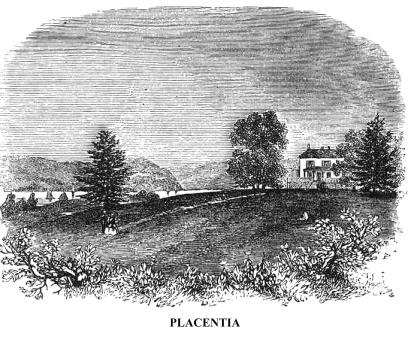 name
from Peter Faulconier, the private secretary of Sir Edward Hyde (afterwards
Lord Cornbury), the governor of the province of New York at the beginning
of the last century. Faulconier purchased a large tract of land at this place,
and named it Hyde Park in honour of the governor. Here the aspect of the western
shores of the river changes from gently sloping banks and cultivated fields
to rocky and precipitous bluffs; and this character they exhibit all the way
to Hoboken, opposite New York, with few interruptions.
name
from Peter Faulconier, the private secretary of Sir Edward Hyde (afterwards
Lord Cornbury), the governor of the province of New York at the beginning
of the last century. Faulconier purchased a large tract of land at this place,
and named it Hyde Park in honour of the governor. Here the aspect of the western
shores of the river changes from gently sloping banks and cultivated fields
to rocky and precipitous bluffs; and this character they exhibit all the way
to Hoboken, opposite New York, with few interruptions.
At Hyde Park the river makes a sudden bend between rocky bluffs, and in a narrower channel. On account of this the Dutch settlers called the place Krom Elleboge, or Crooked Elbow. As is frequently the case along the Hudson, the present name is a compound of Dutch and English, and is called Crom Elbow.
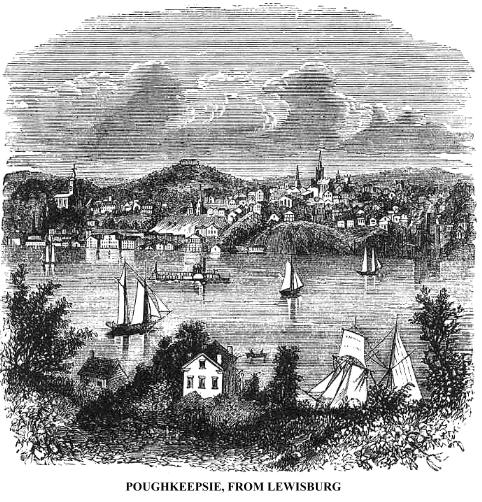 Six
miles below Hyde Park is the large rural city of Poughkeepsie, containing
about 17,000 inhabitants. The name is a modification of the Mohegan word,
Apo-keep-sinck,* signifying "safe and pleasant harbour."
Between two rocky bluffs was a sheltered bay (now filled with wharves), into
the upper part of which leaped, in rapids and cascades, the Winnakee, called
Fall Kill by the Dutch. The northerly bluff was called by the Dutch Slange
Klippe, or Snake or Adder Cliff, because of the venomous serpents which were
abundant there in the olden time. The southern bluff bears the name of Call
Rock, it having been a place from which the settlers called to the captains
of sloops or single-masted vessels, when passage in them was desired. With
this bay, or "safe harbour," is associated an Indian legend, of
which the following is the substance:-- Once some Delaware warriors came to
this spot with Pequod captives. Among the latter was a young chief, who was
offered life and honour if he would renounce his nation, receive the mark
of the turtle upon his breast, and become a Delaware brave. He rejected the
degrading proposition with disdain, and was bound to a tree for sacrifice,
when a shriek from a thicket startled the executioners. A young girl leaped
before them, and implored his life. She was a captive Pequod, with the turtle
on her bosom, and the young chief was her affianced. The Delawares debated,
when suddenly the war-whoop of some fierce Hurons made them snatch their arms
for defence. The maiden severed the thongs that bound her lover, but in the
deadly conflict that ensued, they were separated, and a Huron chief carried
off the captive as a trophy. Her affianced conceived a bold design for her
rescue, and proceeded immediately to execute it. In the character of a wizard
he entered the Huron camp. The maiden was sick, and her captor employed the
wizard to prolong her life, until he should satisfy his revenge upon Uncas,
her uncle, the great chief of the Mohegans. They eluded the vigilance of the
Huron, fled at nightfall, with swift feet, towards the Hudson, and in the
darkness, shot out upon its bosom, in a light canoe, followed by blood-thirsty
pursuers. The strong arm of the young Pequod paddled his beloved one safely
to a deep rocky nook near the mouth of the Winnakee, concealed her there,
and with a few friendly Delawares whom he had secured by a shout, he fought,
conquered, and drove off the Huron warriors. The sheltered nook where the
maiden lay was a safe harbour for her, and the brave Pequod and his friends
joyfully confirmed its title to Apo-keep-sinck.
Six
miles below Hyde Park is the large rural city of Poughkeepsie, containing
about 17,000 inhabitants. The name is a modification of the Mohegan word,
Apo-keep-sinck,* signifying "safe and pleasant harbour."
Between two rocky bluffs was a sheltered bay (now filled with wharves), into
the upper part of which leaped, in rapids and cascades, the Winnakee, called
Fall Kill by the Dutch. The northerly bluff was called by the Dutch Slange
Klippe, or Snake or Adder Cliff, because of the venomous serpents which were
abundant there in the olden time. The southern bluff bears the name of Call
Rock, it having been a place from which the settlers called to the captains
of sloops or single-masted vessels, when passage in them was desired. With
this bay, or "safe harbour," is associated an Indian legend, of
which the following is the substance:-- Once some Delaware warriors came to
this spot with Pequod captives. Among the latter was a young chief, who was
offered life and honour if he would renounce his nation, receive the mark
of the turtle upon his breast, and become a Delaware brave. He rejected the
degrading proposition with disdain, and was bound to a tree for sacrifice,
when a shriek from a thicket startled the executioners. A young girl leaped
before them, and implored his life. She was a captive Pequod, with the turtle
on her bosom, and the young chief was her affianced. The Delawares debated,
when suddenly the war-whoop of some fierce Hurons made them snatch their arms
for defence. The maiden severed the thongs that bound her lover, but in the
deadly conflict that ensued, they were separated, and a Huron chief carried
off the captive as a trophy. Her affianced conceived a bold design for her
rescue, and proceeded immediately to execute it. In the character of a wizard
he entered the Huron camp. The maiden was sick, and her captor employed the
wizard to prolong her life, until he should satisfy his revenge upon Uncas,
her uncle, the great chief of the Mohegans. They eluded the vigilance of the
Huron, fled at nightfall, with swift feet, towards the Hudson, and in the
darkness, shot out upon its bosom, in a light canoe, followed by blood-thirsty
pursuers. The strong arm of the young Pequod paddled his beloved one safely
to a deep rocky nook near the mouth of the Winnakee, concealed her there,
and with a few friendly Delawares whom he had secured by a shout, he fought,
conquered, and drove off the Huron warriors. The sheltered nook where the
maiden lay was a safe harbour for her, and the brave Pequod and his friends
joyfully confirmed its title to Apo-keep-sinck.
* The name of this city, as found in records and on maps, exhibits a most curious specimen of orthographic caprice, it being spelt in forty-two different ways, as follows:--Pakeepsie, Pacapsey, Pakepsey, Paughkepsie, Pecapesy, Pecapsy, Pecapshe, Pochkeepsinck, Poeghkeepsing, Poeghkeeksingh, Poeghkeepsink, Pochkeepsey, Pochkeepsen, Pochkeepsy, Pochkepsen, Pochkyphsingh, Pockeepsy, Pockepseick, Pockepseng, Pokepsing, Poghkeepsie, Poghkeepsinck, Poghkeepsing, Poghkepse, Poghkepsen, Poghkeepsink, Poghkeepson, Poghkeepse, Pokeepsigh, Pokeepsingh, Pokeepsink, Pokeepsy, Pokesinch, Pokkepsen, Poughkeepsey, Poukeepsie, Poukeepsy, Pikipsi, Picipsi, Pokepsie, Pokeepsie, Poughkeepsie.
Copyright © 1998, -- 2004. Berry Enterprises. All rights reserved. All items on the site are copyrighted. While we welcome you to use the information provided on this web site by copying it, or downloading it; this information is copyrighted and not to be reproduced for distribution, sale, or profit.